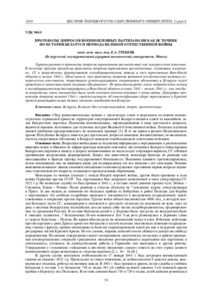Please use this identifier to cite or link to this item:
https://elib.psu.by/handle/123456789/22696Full metadata record
| DC Field | Value | Language |
|---|---|---|
| dc.contributor.author | Гребень, Е. А. | - |
| dc.date.accessioned | 2018-10-02T11:41:21Z | - |
| dc.date.available | 2018-10-02T11:41:21Z | - |
| dc.date.issued | 2018 | - |
| dc.identifier.citation | Вестник Полоцкого государственного университета. Серия A, Гуманитарные науки. - 2018. - № 9 – C. 54 | ru_RU |
| dc.identifier.issn | 2070-1608 | - |
| dc.identifier.uri | https://elib.psu.by/handle/123456789/22696 | - |
| dc.description | Protocols of Interviews of the Military Captured By Partisans as a Source on the History of Belarus of the Period of the Great Patriotic War Y. Hreben | ru_RU |
| dc.description.abstract | Характеризуются протоколы допросов партизанами военнопленных как исторический источник. В качестве примера приведены протоколы допросов партизанами военнопленных, служивших в вермахте, СС и вооруженных формированиях коллаборационистов, взятых в плен партизанами Витебской области в начале 1944 г. Отмечается, что протоколы допросов являются исключительно важным историческим источником, позволяющим реконструировать оперативную обстановку в Беларуси перед проведением наступательной операции «Багратион». Из протоколов видно, какие подразделения немцев и коллаборационистов дислоцировались в Витебской области в конце 1943 – начале 1944 гг., как они были вооружены, какие настроения были среди немецких военнослужащих к концу войны. Датировка протоколов допросов началом 1944 г. свидетельствует об интенсификации сбора партизанами и Красной Армией разведывательных данных накануне освобождения Беларуси.= The article describes the protocols of interrogations by the captured by partisans as a historical source. Examples include interrogation protocols by the captured by partisans who served in the Wehrmacht, SS and armed groups of collaborators captured by partisans of the Vitebsk region in early 1944. It is noted that the interrogation records are an extremely important historical source that allows reconstructing the operational situation in Belarus before an offensive Operation «Bagration». The protocols show which divisions of Germans and collaborators were stationed in the Vitebsk region in late 1943 – early 1944, their level of arming, what sentiments were among the German servicemen at the end of the war. The dating of the interrogation records at the beginning of 1944 gives evidence to the intensification of the collecting by the partisans and the Red Army of intelligence data on the eve of the liberation of Belarus. | ru_RU |
| dc.language.iso | ru | ru_RU |
| dc.publisher | Полоцкий государственный университет | ru_RU |
| dc.relation.ispartof | Веснік Полацкага дзяржаўнага ўніверсітэта. Серыя А, Гуманітарныя навук | be_BE |
| dc.relation.ispartof | Herald of Polotsk State University Series A, Humanity sciences | en_EN |
| dc.relation.ispartof | Вестник Полоцкого государственного университета. Серия A, Гуманитарные науки | ru_RU |
| dc.relation.ispartofseries | Серия A, Гуманитарные науки;2018. - № 9 | - |
| dc.rights | open access | ru_RU |
| dc.subject | Государственный рубрикатор НТИ - ВИНИТИ::ОБЩЕСТВЕННЫЕ НАУКИ::История. Исторические науки | ru_RU |
| dc.subject | Беларусь | ru_RU |
| dc.subject | Великая Отечественная война | ru_RU |
| dc.subject | Допрос | ru_RU |
| dc.subject | Военнопленные | ru_RU |
| dc.subject | Belarus | ru_RU |
| dc.subject | The Great Patriotic War | ru_RU |
| dc.subject | Interrogation | ru_RU |
| dc.subject | Prisoners of war | ru_RU |
| dc.title | Протоколы допросов военнопленных партизанами как источник по истории Беларуси периода Великой Отечественной войны | ru_RU |
| dc.type | Article | ru_RU |
| dc.identifier.udc | 940.5 | - |
| Appears in Collections: | 2018, № 9 | |
Items in DSpace are protected by copyright, with all rights reserved, unless otherwise indicated.
